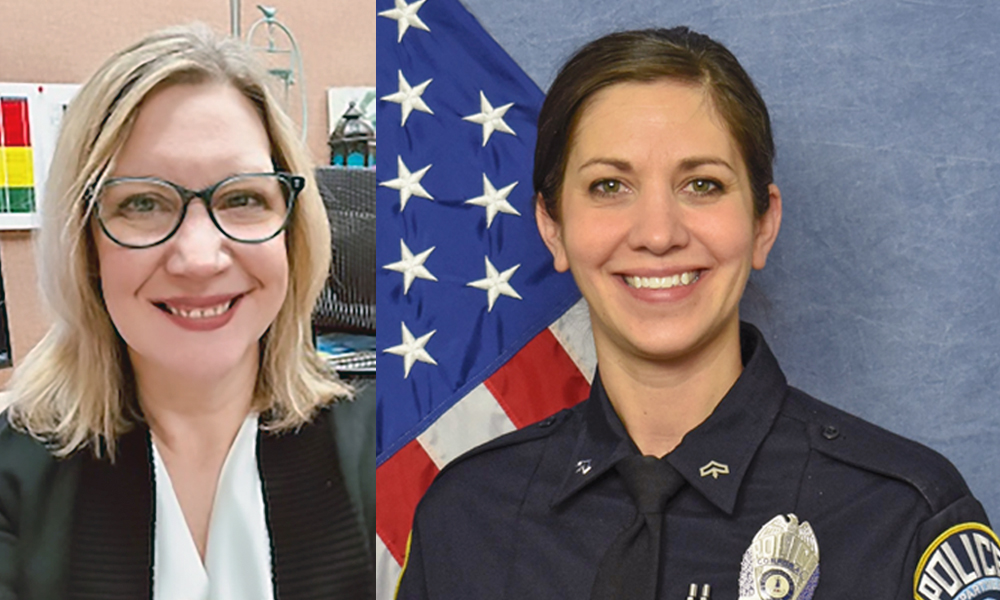CSI experts discuss careers in forensic science
Featured Stories
SUMMARY: The "CSI Effect" is a real concern for real-life forensic scientists contending with the public's expectations of crime scene investigation based on what they've seen on TV. Recently hosting a program for students interested in studying forensic science, the University Career Center welcomed two experts to discuss their experience working in the lab and in the field.
For real-life crime scene investigators, dispelling assumptions about their work is a real challenge.
Tara Crider of the Arlington County Police Department and Theresa Staropoli (’93) of the Virginia Department of Forensic Science work in crime labs analyzing DNA to help solve crimes, and their work goes far beyond what’s often depicted on TV.
“I think probably the No. 1 misconception is that we solve crimes in an hour and that we always find the gun,” Crider said. “Because that’s the way TV has portrayed it. There is a real thing called the CSI effect. ... When we are testifying in court to a jury, a lot of those jury members believe that we do solve crimes in an hour, that we always recover a smoking gun or always recover fingerprints. Part of my job when testifying might be to educate the jury as to reasons why we maybe didn’t recover fingerprints.”
For Staropoli, it’s challenging not always knowing how her work contributes to a criminal case, but she still appreciates her role in the process. “[It’s] very rewarding to know that we are processing evidence to not only help victims and their families, but also occasionally to help the suspects,” she said. “If they’re being accused of a crime, and we eliminate them from having a DNA profile or something, then that is assisting them as well. ... You just sort of have to keep doing the work. And eventually you hear some information about some of the cases that you work, and you’re like, ‘OK, good. Well, I’m glad that helped provide some resolution to someone.’”

As guest panelists in Madison’s recent virtual program “The Real Criminal Minds: Careers in Forensics,” Crider and Staropoli discussed their careers with about 50 student attendees and answered questions about their work. After the program, they shared their email addresses with students interested in learning more.
Facilitated by Sam Squyars, assistant director for career advising at the University Career Center, the hourlong Zoom program allowed Dukes interested in pursuing careers in forensic science or criminal investigation to gain insight from experts in the field.
UCC is developing an innovative approach to programming through its Career Communities. “Career Communities gives us an opportunity to work with students to see past their major in terms of their career goals by focusing on industries,” Squyars said. The effort provides information on career paths to “help students develop a professional network by connecting with employers and alums who have expertise, and sometimes even job/internship opportunities in career areas,” he explained.
The Real Criminal Minds session fit within the Research, Science and Environmental Studies Community, for which Squyars is a career advisor. The Zoom program was developed in response to Dukes expressing interest in learning more about pursuing careers in forensic science.
JMU offers courses for Anthropology, Biology and Chemistry majors that can contribute to pre-forensic studies through the Institute for Innovation in Health and Human Services. These degree programs align with recommendations from the Technical Working Group on Education and Training in Forensic Sciences at the National Institute of Justice, which advises that students interested in forensic science develop a strong background in natural sciences with extensive laboratory coursework.
Though there is no single path to a career in forensic science or criminal investigation, Crider and Staropoli shared their experiences to help guide students on what options they might consider.
Crider, a self-described science nerd, was studying biochemistry and genetics on her way to a career in toxicology when a graduate-level DNA class piqued her interest. “I just thought it’s the most fascinating thing I’d ever done, and I was hooked from then on out,” she recalled.
“I never had any plans to become a police officer,” said Crider, who’s been with Arlington County for 17 years. Learning about the department from her graduate school advisor, a retired Arlington police officer, Crider pursued an internship with the police department. “I loved every minute of it,” she said. “It gave me a different perspective on the field of forensics. That’s kind of how I got my foot in the door into that realm. When I graduated, I did join the police department. I was a regular, old police officer for several years before we had an opening in the Crime Scene Unit.”
Staropoli took a nontraditional route to forensic science after studying history at JMU. “Unlike Tara, I was not initially a science nerd; that came to me over time,” she said. “I had met a friend who was attending Virginia Commonwealth University here in Richmond. He was getting a criminal justice degree, and I saw they had a forensic science program. I looked at that and went, ‘Wow, that really sounds interesting. That sounds like something that I’d like to do.’”
Further influenced by her father’s law-enforcement experience in New York City, she decided to pursue a new career path. “Even though I was not quite a scientific person in high school and college, initially, I thought this was just so interesting — to learn how you could apply science to helping potentially solve crimes.”
Staropoli returned to school, earning a chemistry degree from VCU and a master’s in forensic science from the University of Alabama, Birmingham. Now a principal scientist in the quality assurance section of the Virginia Department of Forensic Science, she has 24 years of crime-lab experience that includes working at the Texas Department of Public Safety Crime Lab in Austin and the Colorado Bureau of Investigation in Pueblo.
Asked about her day-to-day, Crider said, “I could be sitting in our lab doing fingerprint processing, doing DNA swabbing, serial number restoration. I could be in a different state executing a search warrant, or I could be sitting at my desk writing reports. ... A typical day is any of the above.”
Staropoli’s work also varies, whether she’s in the lab, at a computer or in the courtroom. “When I’ve worked at previous labs, I went out to crime scenes,” she said. “We don’t do that here in Virginia.”
She advised students who want to do lab work and fieldwork to research jobs that allow for both. Forensic scientists need “some pretty broad analytical skills [and] the ability to analyze information that’s in front of you,” Staropoli said. “Obviously, if you’re going to be working in the lab, you need a pretty strong science background. If you’re going to be working in DNA, there are specific classes that are required for the FBI quality-assurance standards in order to become a DNA examiner.”
Still, science isn’t always required, Crider said. “To become a crime-scene analyst, at least with the police department, and this might be different with other agencies, but you don’t need a background in science at all,” she said. “In Arlington, there are six of us who are assigned to the Crime Scene Unit. One does have a background in biology, and then I have my background in genetics, biochemistry and forensics. But the rest of them have just random degrees. Some are criminal justice; that’s kind of a common one. But there are a variety of backgrounds that people [bring] into my unit.”
She also suggested students bank on more broadly critical life skills, like character and personal ethics. “To become a police officer, I would say the No. 1 quality that we look for is somebody with integrity, someone who’s honest — both when people are looking and also when people aren’t looking.”
